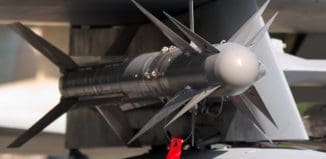How will India’s economy affect the Israeli defense industries?
This post is also available in:  עברית (Hebrew)
עברית (Hebrew)
Israeli defense industries are trying to assess the effect of the economic situation in India on their potential sales there.
 Reflecting the structural weakness of the Indian economy, the country’s currency (Indian rupee) has fallen 20 percent since the beginning of the year. Consequently, the initial $37.7 billion defense budget has now declined to just under $30 billion.
Reflecting the structural weakness of the Indian economy, the country’s currency (Indian rupee) has fallen 20 percent since the beginning of the year. Consequently, the initial $37.7 billion defense budget has now declined to just under $30 billion.
According to a blog post in “All Sorts Of Things ” A $7 billion reduction is not a minor issue for any country’s defense budget, but it is especially worrisome for India because a large percentage of New Delhi’s international military procurements are done with the U.S. dollar, and this decline will hurt the ministry’s ability to purchase the equipment that it needs and/or wants.
Obviously, the defense ministry could ask the finance ministry for additional funds but the latter is unlikely to provide the resources because of the country’s economic troubles and a refocus of its priorities. If the defense ministry does not get these funds or if the rupee does not change course – unlikely to happen in 2013 – then it will have no choice but to re-prioritize its procurements and fund the oldest or the most urgent first. This will leave a number of defense companies in the lurch without a clear indication of when their sales will be realized.
Some of the projects that may be affected by this uncertainty include the Lockheed Martin C-130J aircraft, Airbus Military A330 aerial refuelers, naval equipment and the $12 billion Medium Multi-Role Combat Aircraft program.
iHLS – Israel Homeland Security
The future strength of the Indian defense market will become clear when data is released showing the level of funds provided to the defense ministry next year. Any change will be particularly informative especially if New Delhi is unable to reduce the country’s fiscal deficit below 4.8 percent. The problem for the military procurement budget is that it truly is the low man on the totem pole as New Delhi will focus all of its available energy on domestic programs. The recent approval of the more than $20 billion food security bill reflects this policy priority.
In terms of security spending, the government will likely first ensure salaries remain at current levels and then decide what to spend on procurements. Even still, the security procurements sector, which procures equipment that supports India’s ongoing fight against domestic threats, may be prioritized over the major items noted above.
Unfortunately for the vast number of defense companies who had only just begun to take advantage of India’s vast defense potential, this will force an adjustment of priorities. It will hurt their bottom line since the downward trajectory of India’s defense expenditures is unlikely to be balanced by an increase in another country. Defense spending in the Middle East remains high but since that hasn’t declined for a number of years, it won’t compensate for the Indian decline.
On a positive note, India’s diversity will ensure that it remains a strong market for sales of paramilitary equipment and if these companies can ensure a strong presence in that market, then the trajectory of their bottom line won’t be as severe as feared.






























